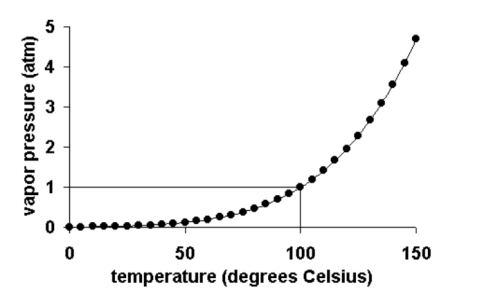Chemistry Exam > Chemistry Questions > The vapour pressure of a given liquid will de...
Start Learning for Free
The vapour pressure of a given liquid will decreases if:
- a)Surface area of liquid is decreased.
- b)The volume of liquid in the container is decreased.
- c)The volume of the vapour phase is increased.
- d)The temperature is decreased.
Correct answer is option 'D'. Can you explain this answer?
Most Upvoted Answer
The vapour pressure of a given liquid will decreases if:a)Surface area...
The vapor pressure of a liquid varies with its temperature, as the following graph shows for water. The line on the graph shows the boiling temperature for water.
As the temperature of a liquid or solid increases its vapor pressure also increases. Conversely, vapor pressure decreases as the temperature decreases.

Free Test
FREE
| Start Free Test |
Community Answer
The vapour pressure of a given liquid will decreases if:a)Surface area...
Explanation:
Vapour pressure is the pressure exerted by the vapours of a liquid in equilibrium with its solid or liquid state. The vapour pressure of a liquid depends on various factors such as temperature, intermolecular forces, surface area, and volume of the liquid and vapour phase.
Effect of temperature on vapour pressure:
The vapour pressure of a liquid is directly proportional to the temperature of the liquid. As the temperature of the liquid increases, the kinetic energy of the molecules increases, and more molecules escape from the liquid surface to form vapours. Thus, increasing the temperature of the liquid increases its vapour pressure.
Effect of surface area on vapour pressure:
The vapour pressure of a liquid is also affected by the surface area of the liquid. A larger surface area provides more surface for the molecules to escape and form vapours. Thus, increasing the surface area of the liquid increases its vapour pressure.
Effect of volume of the liquid phase on vapour pressure:
The volume of the liquid phase does not affect the vapour pressure of a liquid. However, if the volume of the liquid is reduced, the concentration of the liquid increases, which increases the intermolecular forces between the molecules. This, in turn, reduces the vapour pressure of the liquid.
Effect of volume of the vapour phase on vapour pressure:
The volume of the vapour phase also affects the vapour pressure of a liquid. If the volume of the vapour phase is increased, the concentration of the vapour decreases, which reduces the number of molecules escaping from the liquid surface to form vapours. This, in turn, reduces the vapour pressure of the liquid.
Effect of decreasing temperature on vapour pressure:
As mentioned earlier, the vapour pressure of a liquid is directly proportional to the temperature of the liquid. If the temperature of the liquid is decreased, the kinetic energy of the molecules decreases, which reduces the number of molecules escaping from the liquid surface to form vapours. This, in turn, reduces the vapour pressure of the liquid.
Thus, the correct option is D, i.e., the vapour pressure of a given liquid decreases if the temperature is decreased.
Vapour pressure is the pressure exerted by the vapours of a liquid in equilibrium with its solid or liquid state. The vapour pressure of a liquid depends on various factors such as temperature, intermolecular forces, surface area, and volume of the liquid and vapour phase.
Effect of temperature on vapour pressure:
The vapour pressure of a liquid is directly proportional to the temperature of the liquid. As the temperature of the liquid increases, the kinetic energy of the molecules increases, and more molecules escape from the liquid surface to form vapours. Thus, increasing the temperature of the liquid increases its vapour pressure.
Effect of surface area on vapour pressure:
The vapour pressure of a liquid is also affected by the surface area of the liquid. A larger surface area provides more surface for the molecules to escape and form vapours. Thus, increasing the surface area of the liquid increases its vapour pressure.
Effect of volume of the liquid phase on vapour pressure:
The volume of the liquid phase does not affect the vapour pressure of a liquid. However, if the volume of the liquid is reduced, the concentration of the liquid increases, which increases the intermolecular forces between the molecules. This, in turn, reduces the vapour pressure of the liquid.
Effect of volume of the vapour phase on vapour pressure:
The volume of the vapour phase also affects the vapour pressure of a liquid. If the volume of the vapour phase is increased, the concentration of the vapour decreases, which reduces the number of molecules escaping from the liquid surface to form vapours. This, in turn, reduces the vapour pressure of the liquid.
Effect of decreasing temperature on vapour pressure:
As mentioned earlier, the vapour pressure of a liquid is directly proportional to the temperature of the liquid. If the temperature of the liquid is decreased, the kinetic energy of the molecules decreases, which reduces the number of molecules escaping from the liquid surface to form vapours. This, in turn, reduces the vapour pressure of the liquid.
Thus, the correct option is D, i.e., the vapour pressure of a given liquid decreases if the temperature is decreased.

|
Explore Courses for Chemistry exam
|

|
Question Description
The vapour pressure of a given liquid will decreases if:a)Surface area of liquid is decreased.b)The volume of liquid in the container is decreased.c)The volume of the vapour phase is increased.d)The temperature is decreased.Correct answer is option 'D'. Can you explain this answer? for Chemistry 2025 is part of Chemistry preparation. The Question and answers have been prepared according to the Chemistry exam syllabus. Information about The vapour pressure of a given liquid will decreases if:a)Surface area of liquid is decreased.b)The volume of liquid in the container is decreased.c)The volume of the vapour phase is increased.d)The temperature is decreased.Correct answer is option 'D'. Can you explain this answer? covers all topics & solutions for Chemistry 2025 Exam. Find important definitions, questions, meanings, examples, exercises and tests below for The vapour pressure of a given liquid will decreases if:a)Surface area of liquid is decreased.b)The volume of liquid in the container is decreased.c)The volume of the vapour phase is increased.d)The temperature is decreased.Correct answer is option 'D'. Can you explain this answer?.
The vapour pressure of a given liquid will decreases if:a)Surface area of liquid is decreased.b)The volume of liquid in the container is decreased.c)The volume of the vapour phase is increased.d)The temperature is decreased.Correct answer is option 'D'. Can you explain this answer? for Chemistry 2025 is part of Chemistry preparation. The Question and answers have been prepared according to the Chemistry exam syllabus. Information about The vapour pressure of a given liquid will decreases if:a)Surface area of liquid is decreased.b)The volume of liquid in the container is decreased.c)The volume of the vapour phase is increased.d)The temperature is decreased.Correct answer is option 'D'. Can you explain this answer? covers all topics & solutions for Chemistry 2025 Exam. Find important definitions, questions, meanings, examples, exercises and tests below for The vapour pressure of a given liquid will decreases if:a)Surface area of liquid is decreased.b)The volume of liquid in the container is decreased.c)The volume of the vapour phase is increased.d)The temperature is decreased.Correct answer is option 'D'. Can you explain this answer?.
Solutions for The vapour pressure of a given liquid will decreases if:a)Surface area of liquid is decreased.b)The volume of liquid in the container is decreased.c)The volume of the vapour phase is increased.d)The temperature is decreased.Correct answer is option 'D'. Can you explain this answer? in English & in Hindi are available as part of our courses for Chemistry.
Download more important topics, notes, lectures and mock test series for Chemistry Exam by signing up for free.
Here you can find the meaning of The vapour pressure of a given liquid will decreases if:a)Surface area of liquid is decreased.b)The volume of liquid in the container is decreased.c)The volume of the vapour phase is increased.d)The temperature is decreased.Correct answer is option 'D'. Can you explain this answer? defined & explained in the simplest way possible. Besides giving the explanation of
The vapour pressure of a given liquid will decreases if:a)Surface area of liquid is decreased.b)The volume of liquid in the container is decreased.c)The volume of the vapour phase is increased.d)The temperature is decreased.Correct answer is option 'D'. Can you explain this answer?, a detailed solution for The vapour pressure of a given liquid will decreases if:a)Surface area of liquid is decreased.b)The volume of liquid in the container is decreased.c)The volume of the vapour phase is increased.d)The temperature is decreased.Correct answer is option 'D'. Can you explain this answer? has been provided alongside types of The vapour pressure of a given liquid will decreases if:a)Surface area of liquid is decreased.b)The volume of liquid in the container is decreased.c)The volume of the vapour phase is increased.d)The temperature is decreased.Correct answer is option 'D'. Can you explain this answer? theory, EduRev gives you an
ample number of questions to practice The vapour pressure of a given liquid will decreases if:a)Surface area of liquid is decreased.b)The volume of liquid in the container is decreased.c)The volume of the vapour phase is increased.d)The temperature is decreased.Correct answer is option 'D'. Can you explain this answer? tests, examples and also practice Chemistry tests.

|
Explore Courses for Chemistry exam
|

|
Signup for Free!
Signup to see your scores go up within 7 days! Learn & Practice with 1000+ FREE Notes, Videos & Tests.



















